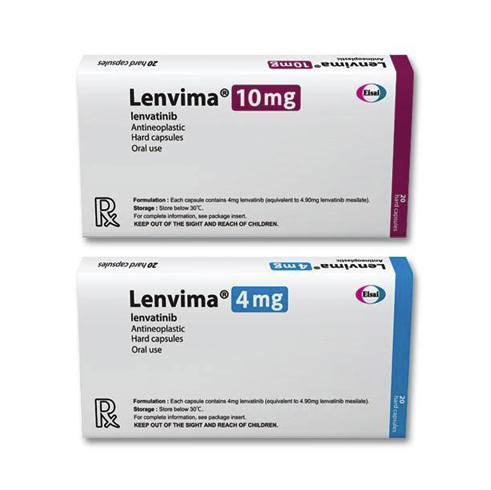Keytruda (pembrolizumab) vs Lenvima (lenvatinib)
Keytruda (pembrolizumab) vs Lenvima (lenvatinib)
Keytruda (pembrolizumab) is an immune checkpoint inhibitor that works by enhancing the body's immune response against cancer cells, commonly used for various types of cancers including melanoma, lung cancer, and head and neck cancer. Lenvima (lenvatinib) is a tyrosine kinase inhibitor that targets specific proteins to prevent the growth of cancer cells, and it's often used for thyroid cancer, kidney cancer, and in combination with other drugs for endometrial carcinoma. The choice between Keytruda and Lenvima would depend on the specific type of cancer, its genetic makeup, the patient's overall health, and the treatment plan recommended by the oncologist, as each drug has a different mechanism of action and side effect profile.
Difference between Keytruda and Lenvima
| Metric | Keytruda (pembrolizumab) | Lenvima (lenvatinib) |
|---|---|---|
| Generic name | Pembrolizumab | Lenvatinib |
| Indications | Various types of cancers including melanoma, lung cancer, head and neck cancer, Hodgkin lymphoma, and others | Thyroid cancer, renal cell carcinoma, hepatocellular carcinoma |
| Mechanism of action | Programmed death receptor-1 (PD-1) blocking antibody | Tyrosine kinase inhibitor |
| Brand names | Keytruda | Lenvima |
| Administrative route | Intravenous infusion | Oral |
| Side effects | Fatigue, musculoskeletal pain, decreased appetite, pruritus, diarrhea, nausea, rash, fever, cough, dyspnea, constipation, pain, and abdominal pain | Hypertension, fatigue, diarrhea, decreased appetite, weight loss, nausea, stomatitis, headache, vomiting, proteinuria |
| Contraindications | Individuals with hypersensitivity to pembrolizumab or any of its excipients | Individuals with hypersensitivity to lenvatinib or any of its excipients |
| Drug class | Anti-PD-1 monoclonal antibody | Multikinase inhibitor |
| Manufacturer | Merck & Co. | Eisai Co., Ltd. |
Efficacy
Keytruda (Pembrolizumab) and Kidney Cancer
Keytruda, also known by its generic name pembrolizumab, is an immunotherapy drug that has shown efficacy in the treatment of various types of cancer, including kidney cancer. Specifically, pembrolizumab is a programmed death receptor-1 (PD-1) blocking antibody that works by enhancing the body's immune system to detect and fight cancer cells. In kidney cancer, the efficacy of Keytruda has been evaluated in clinical trials, with a focus on advanced renal cell carcinoma (RCC), the most common type of kidney cancer. When used in combination with other therapies or as a monotherapy in certain settings, Keytruda has demonstrated an ability to improve overall survival and progression-free survival rates in patients with advanced RCC.
Lenvima (Lenvatinib) and Kidney Cancer
Lenvima, or lenvatinib, is a targeted therapy that inhibits multiple receptor tyrosine kinases (RTKs) associated with the pathogenesis of cancer, including those implicated in the growth of renal cell carcinoma. Lenvatinib is used for the treatment of advanced RCC, often in combination with other agents. The efficacy of Lenvima in kidney cancer has been shown in clinical trials where it has been associated with a delay in the progression of cancer and an extension of progression-free survival. Lenvatinib, particularly when used in combination with pembrolizumab, has been found to enhance anti-tumor activity compared to either agent alone.
Combination Therapy in Kidney Cancer
The combination of Keytruda and Lenvima has been studied as a treatment regimen for patients with advanced renal cell carcinoma. This combination leverages the immune-boosting effects of pembrolizumab with the targeted anti-angiogenic effects of lenvatinib. Clinical trials have shown that this combination therapy can lead to significant improvements in efficacy outcomes, including overall response rate, progression-free survival, and overall survival, compared to traditional therapies. The synergistic effect of the combination has been a promising advancement in the treatment of advanced RCC, offering an option for patients who may not respond to traditional treatments.
Conclusion
In conclusion, both Keytruda and Lenvima have individually shown efficacy in the treatment of kidney cancer, with increased benefits observed when used in combination. The use of pembrolizumab and lenvatinib together represents a significant development in the management of advanced renal cell carcinoma, providing hope for improved outcomes in patients with this challenging disease. As with all cancer treatments, the efficacy of these medications can vary from patient to patient, and treatment decisions should be made on an individual basis by healthcare professionals in consultation with their patients.
Regulatory Agency Approvals
Keytruda
-
European Medical Agency (EMA), European Union

-
Food and Drug Administration (FDA), USA

-
Health Canada

-
Therapeutic Goods Administration (TGA), Australia

-
Medsafe (NZ)

Lenvima
-
European Medical Agency (EMA), European Union

-
Food and Drug Administration (FDA), USA

-
Health Canada

-
Pharmaceuticals and Medical Devices Agency (PMDA), Japan

-
Therapeutic Goods Administration (TGA), Australia

Access Keytruda or Lenvima today
If Keytruda or Lenvima are not approved or available in your country (e.g. due to supply issues), you can access them via Everyone.org.
How it works

Make an enquiry
Choose the medicine you want to buy, answer a couple of questions, and upload your prescription to speed things up. We’ll get back to you within 24 hours.


Make an enquiry
Choose the medicine you want to buy, answer a couple of questions, and upload your prescription to speed things up. We’ll get back to you within 24 hours.


Breeze through the paperwork
We'll guide you through the required documents for importing unapproved medicine, ensuring you have all the necessary information.


Get a personalized quote
We’ll prepare a quote for you, including medicine costs and any shipping, administrative, or import fees that may apply.


Receive your medicine
Accept the quote and we’ll handle the rest - sourcing and safely delivering your medicine.

Some text on this page has been automatically generated. Speak to your physician before you start a new treatment or medication.
Let's talk
If you have any questions, call us or send us a message through WhatsApp or email:
Contact us




